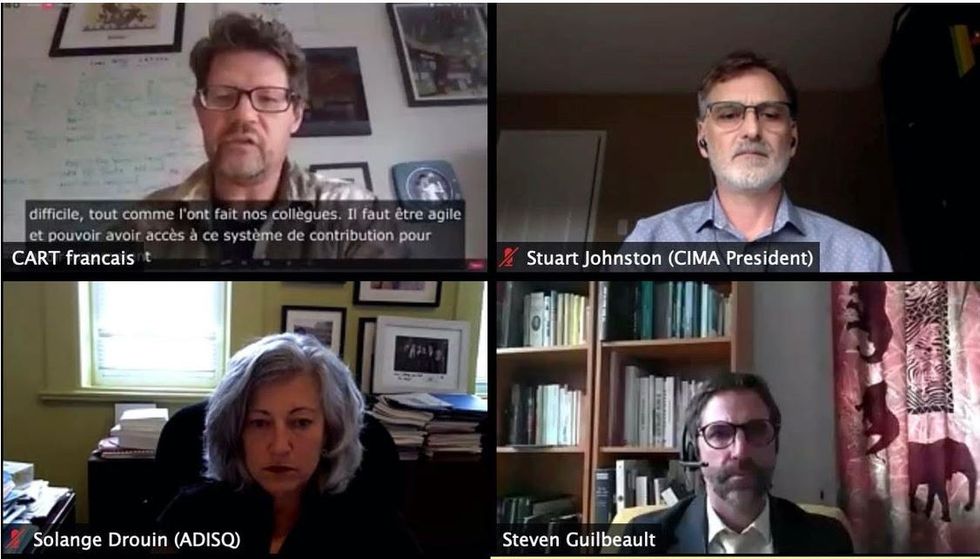A Report On Minister Guilbeault's Music Biz Town Hall Summit
Wednesday afternoon, various reps from the music industry held a virtual town hall with Heritage Minister Steven Guilbeault. The session was marred by technical difficulties from the Minister's end, but the exchange did provide encouragement that the next budget will include some needed remedies to cushion the pandemic's merciless crush on age-old economics. Pictured: Sonic Unyon's Tim Pototic, CIMA's Stuart Johnston, ADISQ's Solange Drouin and Guilbeault.

By Karen Bliss
Minister of Canadian Heritage Steven Guilbeault had more than 50 questions forwarded to him that he didn’t have time to answer during an hour-long Virtual Town Hall Wednesday (Sept. 9) afternoon with members of the Canadian music industry and said he was open to another session later this year.
Of note, portions of his comments cut out due to audio issues, but FYI Music News only used those quotes heard in full.
Weeks in advance of the Zoom call, organized by ADISQ, CIMA and Music Canada, with assistance from the Minister’s office, participants were asked to email in their ideas or questions “on recovery measures that would ensure the music sector’s economic recovery in response to the COVID-19 pandemic.” The live industry, in particular, was halted in mid-March.
Moderated by CIMA president Stuart Johnston and ADISQ public affairs VP and general director Solange Drouin in both English and French (there was a convenient “translate” button), the chat was roughly divided into two parts, industry perspectives from the speakers — Gourmet Délice (Bonsound Concerts), Claude Larivée (Agence La Tribu), Tim Potocic (Sonic Unyon Records/Supercrawl), Sheri Jones (Jones & Company Artist Management), Joëlle Robillard (Musique Nomade), Natalie Bernardin (Amixie Solutions) and Miro Oballa (Taylor Oballa Murray Leyland LLP/Advance: Canada’s Black Music Business Collective) — followed by the Minister’s responses, then questions submitted in advance or in the Q&A area of the platform.
Since the pandemic shuttered the live music industry and impacted other music industry sectors, Justin Trudeau’s Liberal government has demonstrated a willingness to adapt to feedback and concerns regarding the livelihood of those in the industry, including musicians, and added funds and exceptions to try to ensure no one needing financial aid falls through the cracks. One adjustment for example was ensuring that royalties did not count as income for the Canada Emergency Response Benefit (CERB).
In May, a $500 million fund was announced as part of the COVID-19 Emergency Support Fund, to be disbursed to address gaps. Funding applications from sectors of the Canadian music industry were due last month for parts one and two. Of the $500 million fund, $20 million has been allocated to help the live music industry and $5 million for the recording industry.
Johnston began by praising Guilbeault’s “leadership during this time of crisis” and calling the government “a strong partner for the music industry,” adding that he’s hoping “today’s session provides you with the information you need to continue this important work.”
Johnston went on to say something we in the industry all know, that the “Canadian and global music industry is experiencing unprecedented upheaval and turmoil due to the pandemic and we will not be on the road to true recovery until live events, involving critical masses of people, will be permitted again and true international exporting activities resume…long-term support is key to the full recovery and success of the sector.”
He added: “Government has a key role to play over the next two years to help maintain jobs and support business continuity for those heavily impacted by the pandemic and we know that policy frameworks like the copyright reform can and should play a crucial role in supporting the industry and copyright owners going forward. We look forward to seeing those changes the music industry has advocated for.”
A welcome ally who listened and understood the concerns and realities of our business, the Minister said, “We all know what covid did to the sector and more broadly to arts and culture. We can agree that our government has certainly tried to be as nimble as we could through this pandemic, adjusting our measures, adapting them, extending them in some cases, CERB, the Canadian Emergency Wage Subsidy [CEWS], the $500 million dollar Canadian Heritage Emergency Fund, but as the Prime Minister and I have said a number of times these were first steps and now we have to draw our attention towards the recovery.
“I’m well aware of the fact that for several of you, the idea of a recovery is far into the future, but we have to start thinking about the way in which we can continue to support you to get through this crisis. Of course, we want a strong recovery. We especially want to rebuild the sector so that it is more resilient and stronger than it was before. So we have some proposals, (an) assessment framework that contains several aspects, how to ensure the sustainability of arts and culture by providing more stable sources of funding, and also better remuneration for artists. You've seen that in the case of the CERB, we plan to have it until 2021. It won't be called the CERB, but it will be a 2.0 version of it — that proposal, of course, has to be passed by Parliament.
“To us, clearly we need to support the ecosystem and the organizations and the artists and artisans who make up this sector,” he continued. “Second, how to maintain the demand for our cultural sector products? How about the underrepresented groups who could be making a living in this sector specifically in leadership positions, certainly with respect to diversity, et cetera. And that partly is our job in terms of our nominations from the Federal government, but it's also a collective effort that has to happen. And the last point that will be of no surprise is to reduce the environmental footprint of arts, culture and heritage.”
The panelists all spoke, outlining the hardships covid has presented, some asking for key things, such as flexibility in regards to spending of the grants over the next two to three years to ensure staff are continued to be employed, as well as revamping existing programs, adding new ones, and additional relief funds.
Of the many points the Minister addressed regarding the government’s help:
– He cannot federally mandate one-metre apart with masks if seated indoors (“that would be the Federal government infringing on provincial and territorial jurisdictions that would not go down very well”), nor can he federally recommend slowly increasing socially-distanced capacity at small to medium venues to facilitate domestic touring (“we are reliant on public health authorities”), but when pressed he said he will broach the topic with his provincial and territorial colleagues “and encourage them to do it.”
– Changes need to be made to existing grant applications (some of whose criteria hasn’t changed in two decades) and new ones to make them more open to Black, Indigenous and People of Colour (BIPOC), as well programs to offer more support, representation and training. “The difficulties of accessing our funds and funding programs is in and of itself an example of what white systemic racism looks like. One of the reasons we want to do a review of those programs is to facilitate access to underrepresented groups in our society,” he said.
As the Minister working on the implementation of the Indigenous Languages Act, Guilbeault said he is “looking at programs that would be more targeted to language minority communities and also Indigenous communities.” He added, “We set aside 40% of the $500 million envelope for groups and orgs we do not fund, recognizing that there are funding gaps between our funding and Canadian Heritage, and Telefilm or FACTOR/Musicaction [and] Canada Council.”
Another gamechanger, readied pre-pandemic, is the tabling of the Broadcasting Act review, which includes the recommendation that “web giants pay their fair share with respect to cultural content investment,” Guilbeault said.
“We’re fully aware that the [covid] crisis is not over and won’t be over in four months’ time either, and probably won’t be done in eight months either. We need to continue to be there and the specific goal of these meetings that I started last week, these consultations, the purpose is to hear from you, to better understand your needs so that we can then put forward the right proposals to the government, in cabinet, the Minister of Finance, in order to support this sector until we’re back to a situation that I don’t think we can refer to as normal, but at least more normal than what we’re dealing with today.”
















